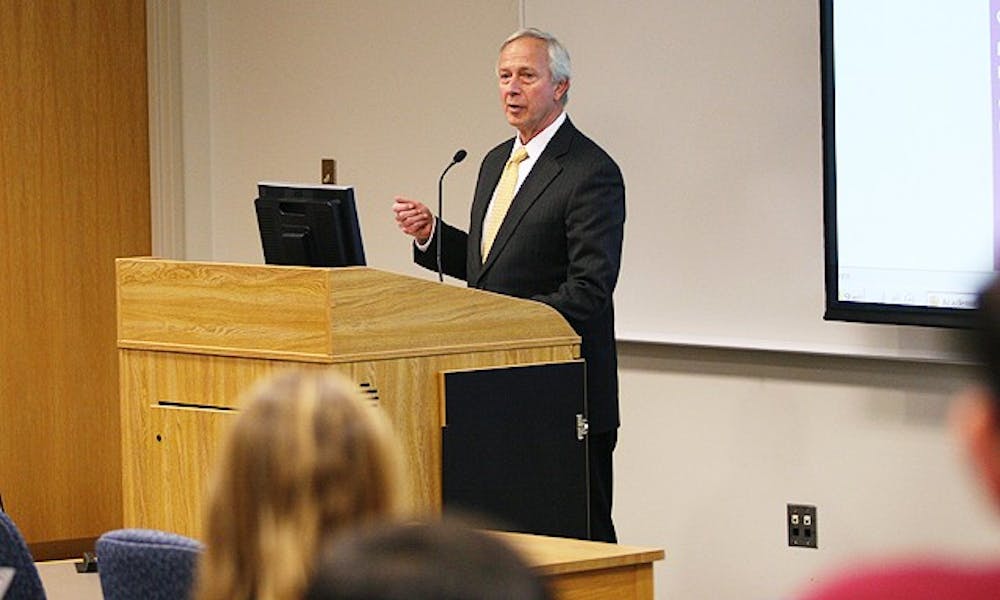The first phase of Duke Kunshan University is expected to cost Duke $37 million, according to a document released Thursday at Academic Council.
Administrators estimate that $70.5 million—between $5.4 million and $15.6 million each year for six years—will be necessary to ensure that DKU’s initial operating costs are fully met. According to the “Duke-Kunshan Planning Guide” document, Duke and the city of Kunshan are jointly funding the subsidies, with the University covering 52 percent of the costs—$37 million—and the city covering 48 percent of the costs—$33.5 million.
To pay for its part of the subsidy, Duke will draw from four sources, according to the document, which was last updated March 15. An estimated total of $9.1 million will come from central administrative funding, $7.5 million from the reallocation of current Durham campus funds, $10.4 million from the reallocation of current Fuqua School of Business funds and $10 million from philanthropic efforts. So far, $5 million of the philanthropic funding has been secured, according to the document, which was produced by the Office of the Provost and the Office of Global Strategy and Programs.
“World-class education is always subsidized, by government or by the donations of individuals or the historic wealth of the institution,” states the document. “We cannot hope to have world-class education in Kunshan without similar subsidy sources, and for a young university not yet achieving economies of scale, without historic wealth and without a broad donor base, the founding partners must play a substantial role.”
The report notes, however, that as much as possible tuition will fund the campus’ operating budget.
Brodhead visited Academic Council Thursday to give an overview of the Board of Trustees’ February meeting, but he did not address the Kunshan budget in his prepared statement. In the discussion that followed, however, professor of political science Paula McClain raised the issue and asked if the extensive costs to Kunshan would be detrimental to the Durham campus.
Provost Peter Lange noted that the guide in full is 47 pages long, but the released document is a 23-page abridged version.
Council members also posed several questions regarding the details of the Chinese campus at the meeting.
Several members asked if DKU will be able to provide unrestricted Internet access, which is not available throughout most of China, and how Internet restrictions would affect its relationship with the national government. Brodhead said he is fairly certain that the campus will have unrestricted Internet access, in part because China wants to learn from Duke as a model of Western university education.
“What makes Western universities so great is the idea of academic freedom,” he said. “If China wants to get the value on its end of the experiment, it has to learn to open itself.”
Associate professor of physics Steffen Bass said he has not heard any discussion of the campus’ surrounding area, noting that he hopes that students will be able to easily engage in local Chinese culture.
“We don’t want this campus to be in some kind of enclave,” Bass said. “Very little in the guide tells us about whether or not it is in a remote area where cultural exchange is not possible.”
DKU is located in a less-populated area of Kunshan, Brodhead said, comparing the area surrounding DKU to the area surrounding the Durham campus. He added that a student can easily take a 16-minute train ride to downtown Shanghai.
In other business:
Kevin Smith, scholarly communications officer for Perkins Library, and Paolo Mangiafico, director of digital information strategy, updated the council on the Open Access policy that was passed in March 2010. The policy allows Duke scholars to publish their articles in a database—called DukeSpace—and make them available to the public.
As of Thursday, Smith said DukeSpace has 2,286 articles with more than 100 to be uploaded in the near future. The database currently has more than 360,000 item views, though Smith qualified the number by attributing many of the hits to maintenance views and search engines that pick up articles without them necessarily being opened by the viewer.
“The stuff in DukeSpace is getting found,” Smith said. “Most users are not going to come through the front door, they’re going to come in through Google or Wikipedia or something like that, and that’s why we think it’s good that [search engines] are finding this site.”
Get The Chronicle straight to your inbox
Signup for our weekly newsletter. Cancel at any time.

